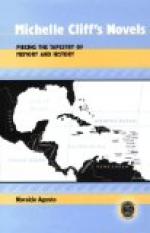|
This section contains 6,643 words (approx. 23 pages at 300 words per page) |

|
SOURCE: "Revolutionary Developments: Michelle Cliff's 'No Telephone to Heaven' and Merle Collins's 'Angel,'" in Ariel, Vol. 24, No. 1, January, 1993, pp. 35-56.
In the following essay, Lima compares and contrasts conventions of the postcolonial Bildungsroman that appear in Cliff's and Collins's novels, highlighting each writer's approach toward representation of revolutionary social transformation.
Michelle Cliff's No Telephone to Heaven (1987) and Merle Collins's Angel (1987), like many other postcolonial novels, indirectly parallel the formation of the young self to that of the developing nation. No Telephone to Heaven, the story of Clare Savage's development into revolutionary consciousness and her involvement in a symbolic act of revolution in Michael Manley's Jamaica, and Angel, a novel about a girl growing up during the people's revolutionary government of Grenada, share a similar authorial project—the possibility of revolutionary social transformation. When Cliff and Collins attempt to figure this transformation through the reconceptualization of the established...
|
This section contains 6,643 words (approx. 23 pages at 300 words per page) |

|


